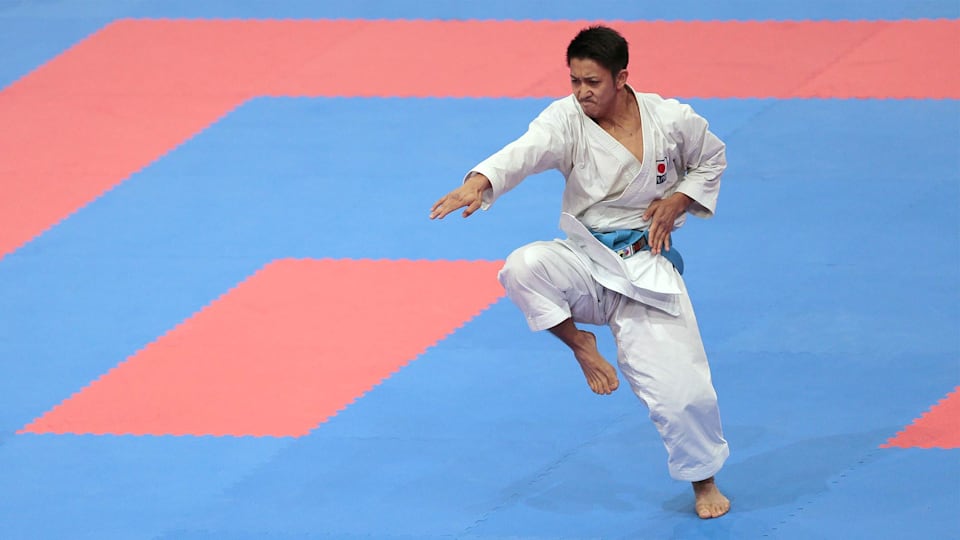Double world champion Kiyuna aims to lead a karate revolution in Japan
Ryo Kiyuna may well go in to his home Olympic Games in 2020 as one of the most likely gold medal winners in the entire Japanese team. The 27-year-old is the 2014 and 2016 World Karate Federation (WKF) world champion, the 2017 World Games gold medallist and is unbeaten in major competition since 2013.

Like so many of his fellow elite athletes, Japan’s karate sensation Ryo Kiyuna puts his success down to hard work, pure and simple. It may sound clichéd, but on close examination his training schedule does give new meaning to the term dedication.
“I do five to six hours each day, seven days a week on technical practice,” he said. “Then one to two hours seven days a week of physical training and finally I teach karate for one to four hours per day, four days a week.”
It is exhausting just to listen to, but for Kiyuna, the chance to claim an Olympic gold medal in front of his compatriots serves as spectacular motivation. He acknowledges that the fear his rivals could be working harder and improving quicker than him is also a driving force.
In kata, the demonstrative side of modern karate, featuring one athlete alone on the mat performing a series of pre-meditated movements, technique and precision are everything.
“I continue practising steadily, day-by-day, reminding myself of the importance of kihon (basic technique),” Kiyuna said. “My goal is to keep improving and to reach my peak level at the Olympic Games.”
The reigning world champion also has a wider, more altruistic incentive beyond personal fulfilment and satisfaction.
“To be honest karate is not the most popular sport in Japan, it is not very well known throughout Japan yet,” he said. This is despite Japan being known as the heartland of karate and the Nippon Budokan, the venue for karate in 2020, being its spiritual home.
“To be an Olympic sport should be a great opportunity for karate, especially considering the ties of karate with the Japanese traditional culture,” Kiyuna said. “It will be the chance to make the discipline even more popular in Japan.
“It would be great, if thanks to this event (the 2020 Olympic Games) karate becomes a major sport in Japan.”
The world number one is very aware that among the pantheon of great karateka, his timing is exquisite. The sport has long fought for exposure on the world’s biggest stage, coming close several times. Now karate’s time has come and so indeed has Kiyuna’s.
To be an Olympic sport should be a great opportunity for karate, especially considering the ties of karate with the Japanese traditional culture, It will be the chance to make the discipline even more popular in Japan. Ryo Kiyuna
- Ryo Kiyuna
“Karate’s ratification as an Olympic sport was so timely and it represents such a good opportunity for me. So I do hope that I will be able live up to this historic moment for our discipline,” he said.
Japan is experiencing a wonderfully orchestrated dominance in karate as a whole and in the kata discipline in particular. At the 2016 World Championships in Linz, Austria, Japan won the men’s and women’s individual kata titles and the men’s and women’s kata team gold medals. They followed it up with an even more extraordinary display in Paris this year, in the opening WKF Karate 1 Premier League competition of 2017. Ono Hikaru took the individual female kata title before Kiyuna led home a Japanese one-to-six clean sweep in the men’s division.
Unsurprisingly, Kiyuna is aware of the pressure to keep performing with so many countrymen ready to pounce if he does not.
“I think other athletes from different countries have the same feelings that I have,” he said. “Whenever I participate in international championships I never forget to hold my pride firmly as a Japanese representative, thinking of the fellow karateka who have competed furiously over the years to represent Japan.”
It is clearly working. A quick glance at Kiyuna’s profile on the WKF’s website reveals a torrent of first-place finishes. The last time the Japanese athlete did not win a major competition was the World Combat Games in Russia in 2013 – when he took silver.
Remarkably, Japan has a match and more for Kiyuna, on the female side. Like her compatriot, Kiyou Shimizou is the two-time reigning kata world champion but the 23-year-old’s unbeaten record at major events stretches back to her debut in 2011.
Kiyuna puts such astounding national consistency down to his favourite factor.
“It is because each Japanese athlete keeps a strong awareness that they need to train harder and harder towards the Olympic Games,” he explained.
Kiyuna does, however, go against the grain when asked what he thinks about during his high-intensity two-minute kata routines. He provides a simple, and candid answer.
“I imagine the moment I win a gold medal,” he said.
All indicators point to the fact that he need only imagine this outcome for another three years.
